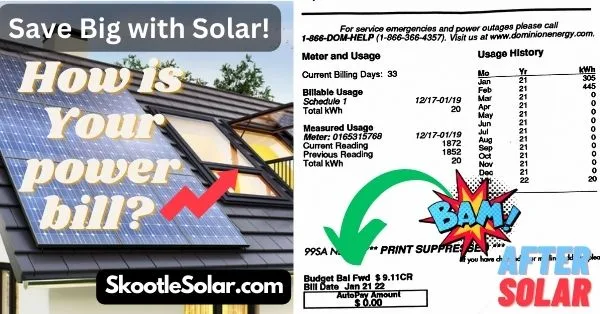Calculate Your Virginia Electric Savings with Solar
Don’t let high electricity bills drain your bank account. Join the thousands of homeowners who have made the switch to solar and start saving money today.

The Ideal Solar Solution for Virginia Solar Energy
Supported by Trusted Brands
Skootle Solar – Rated the on of the top solar installers in Virginia. Get in Touch with Our Specialists to Obtain a Comprehensive Solar Proposal, including the System Cost, Potential Savings on Your Electricity Bills, and ROI Timeline. Determine if Your Roof is Eligible for Solar Installation and Find the Best Home Solar Panels, Installation, Financing, and Maintenance Services Suited for Your Needs.
Solar Power in Virginia Supported By Skootle Solar
Full Service
We'll Be There for You Every Step of the Way - From Installation and Approving System Designs to Providing Financing for Your System.
Save
By installing solar panels, homeowners and businesses can reduce monthly expenses, potentially eliminate them entirely, and increase property value.
Zero Down Financing
Save money on electricity bills from day one while making affordable payments towards their solar panel system
Incentives
Maximize Virginia Solar Incentives and Earn Credits Towards Your Electric Bill. Contribute to a Greener Environment while Boosting Your Home's Value.
Virginia Solar Panel Incentives: Rebate Programs and Incentives Explained
With decreasing installation and hardware expenses and one of the nation’s leading incentive programs, transitioning to solar energy is now more financially advantageous than ever before.
What is the Solar Federal Tax Credit?
The solar federal tax credit is a dollar-for-dollar reduction in the amount of federal income tax you owe. This means that if you owe any federal income tax, you can use the money you get from the solar tax credit to pay some or all of what you owe in taxes. The tax credit was initially set to be 26% in 2022 and was supposed to drop to 22% in 2023. However, under the inflation reduction act passed in 2022, the tax credit was set to 30% and will remain there until 2032.
How to Get the Tax Credit
To get the tax credit, you must have a solar system installed in your home. You can get the tax credit worth 30% of the cost to go solar. This includes the cost of solar panels, wires, mounting equipment, converters, labor, and any related taxes and permits. There is no limit to how much you can get on the tax credit, and you can also use it on a battery system.
Who Can Benefit from the Tax Credit?
Even if you don’t owe any federal income tax, you may still be able to get the tax credit. The reason is that for most people, their employer is collecting federal income tax from their paycheck throughout the year. This means that they have been paying federal income tax throughout the year, so they do have income tax to apply the solar tax credit dollars to.
Virginia has a statewide net metering policy, which is one of the best ways to take advantage of solar power in the state. Net metering means that your relationship with the power company becomes a two-way relationship. During the daytime hours when your solar panels are producing electricity, you’re able to power your home directly using solar power, and you can even sell any excess solar back to the power company. Your meter will roll backwards, building up credits on your account, which can then cover what you have to pull back in from the power company during the evening hours.
Net metering is available to all Virginia solar homeowners who have a for-profit utility, like Dominion Energy or Appalachian Electric Power. The state law requires that these utilities offer one-for-one net metering. Most of the member-owned co-ops, like Southside Electrical Co-op, Rappahannock Electric Co-op, and Northern Neck Electric Co-op, also offer net metering.
Virginia is also a solar access rights state, which means that state law protects your right as a homeowner to access solar power. This protects you from any kind of restrictions that your homeowners association (HOA) might try to impose on you. The HOA is blocked from making any kind of restriction that would reduce your solar power output by more than 10 percent. Even if the HOA tells you that you can only put your solar panels on the back of the house, if that change would impact your solar power access by more than 10 percent, the HOA is legally blocked from doing so. This means that your rights to access solar power are very good in Virginia.
What are SRECs?
SRECs are Virginia Solar Renewable Energy Credits or Virginia Solar Renewable Energy Certificates. They represent a monetary value for producing renewable energy. In Virginia, every time a solar system produces a 1,000 kilowatt-hours of electricity, it earns one SREC. These credits can be sold in a marketplace, and their value is determined by supply and demand.
The Virginia Solar SREC Market
In 2020, Virginia passed the Virginia Clean Economy Act of 2020, which mandates Dominion Power and Appalachian Power to purchase SRECs from solar system owners. Dominion Power is required to reach 100% renewable energy by 2045, and Appalachian Power is required to reach 100% renewable energy by 2050. As a result, these utility companies have to buy SRECs from solar system owners in Virginia, creating a lucrative market for solar owners.
Currently, the value of SRECs in Virginia is around $68 per credit, and this value is expected to decline over time. However, there is a penalty that utility companies can pay instead of buying SRECs, currently set at $75. This creates a price ceiling for SRECs in Virginia, even though their value increases by 1% each year.
Selling SRECs
If you are a solar system owner in Virginia, you can sell your SRECs through a reputable solar company that sells them on your behalf or through a broker in the Virginia market. Historically, solar system owners in Virginia were able to sell their SRECs in Pennsylvania or other PJM markets. However, now, for the first time, Virginia solar system owners can receive more money by selling their SRECs within the Virginia market.
Conclusion
SRECs provide an excellent opportunity for solar system owners in Virginia to monetize their clean energy production. By selling SRECs, solar system owners can earn additional income, making solar energy more economically viable. With Dominion Power and Appalachian Power mandated to purchase SRECs, the Virginia SREC market is expected to grow in the coming years. If you are a solar system owner in Virginia, it’s worth exploring the potential of SRECs and how they can benefit you.Virginia
The recent amendment to Virginia’s local tax law offers significant benefits to residential solar owners with systems that have a generating capacity of 25 kilowatts or less. Specifically, the amendment states that:
- Such solar facilities are now classified as a separate class of property for local taxation, distinct from other types of real or personal property.
- As a result, these facilities are wholly exempt from state and local taxation under Article X, Section 6 (d) of the Constitution of Virginia.
- This exemption will be effective beginning in the next tax year and will last for at least five years.
Therefore, this amendment offers substantial financial benefits to residential solar owners with smaller systems, as they will no longer have to pay any state or local taxes on their solar facilities. This exemption could encourage more homeowners to invest in solar energy, as they will be able to enjoy the benefits of renewable energy without facing additional financial burden. Furthermore, this exemption could promote the growth of Virginia’s clean energy sector and reduce the state’s carbon footprint, benefiting the environment and public health.
#1 Solar Panel Savings Calculator
Are you curious about how much you could save by switching to solar energy?
Our Solar Panel Savings Calculator can help you estimate your potential savings in just a few clicks.
Solar Panel Estimator by State
Our solar panel estimator takes into account your location and the average daily sunlight hours in your state to provide you with an accurate estimate of your potential savings.
Solar Panel Savings Calculator
Our Solar Savings Calculator helps you estimate your monthly and yearly savings based on your solar panel system’s size and your current electricity rate.
Solar Savings Estimator
Our Solar Savings Estimator can help you determine the payback period for your solar panel system based on your initial investment and estimated monthly savings.
How do you calculate solar panel savings?
To calculate solar panel savings, you need to determine the size of the solar panel system you require, your current electricity rate, and your location’s average daily sunlight hours. With this information, you can calculate the system’s energy output and the potential savings by multiplying the energy output by your current electricity rate.
How much do solar panels reduce bills by?
The amount that solar panels can reduce bills by depends on several factors, such as the size of the solar panel system, your location, your current electricity rate, and your energy consumption. Solar panels can reduce electricity bills by 50-100% on average.
How much do solar panels save per month?
The amount that solar panels can save per month varies depending on your electricity consumption, location, and solar panel system size. On average, solar panel systems can save homeowners around $100 to $200 per month.
How much on average can you save with solar panels?
The amount that you can save with solar panels on average depends on several factors, such as the size of the solar panel system, your location, your energy consumption, and your current electricity rate. However, homeowners can save on average around $600 to $2,500 per year on electricity bills.
How to calculate solar panel output?
To calculate solar panel output, you need to determine the size of your solar panel system and your location’s average daily sunlight hours. With this information, you can estimate the system’s energy output by multiplying the size of the system by the daily sunlight hours and a conversion factor. Our Solar Savings Calculator factors all this in to account for you.
How many solar panels do I need?
The number of solar panels you need depends on several factors such as your energy consumption, the size of the solar panel, and your location’s daily sunlight hours. We can help you determine the exact number of solar panels you need based on your energy needs and the available roof space. Just hit the “Request a Solar Analysis” button on our page and fill in your information. We can provide you with a roof report and solar analysis to see if your house is a good fit or qualifies for solar.
How much do solar panels cost in Virginia?
Solar costs in Virginia vary depending on a number of factors, such as the size of the system, and the quality of the components. However, as of 2023, the average cost of a solar panel installation in Virginia ranges from $2.80 to $3.50 per watt, with an average cost of $3.15 per watt. For a 5kW system, this translates to a total cost of around $15,750 to $19,250, while a 10kW system can cost anywhere from $28,000 to $35,000. Factors include the shading, type of roof, any upgrades needed, etc.
It’s important to note that these costs are before any potential tax incentives or rebates, which can significantly reduce the cost of going solar. The federal solar tax credit, for example, provides a 30% credit on the total cost of a solar system installed in 2023, which can help bring down the overall cost.
There are also a number of financing options available for those who may not be able to afford the upfront cost of a solar system. Solar loans, for example, allow homeowners to finance their solar system over a period of years, with interest rates typically lower than credit cards or personal loans.
Overall, while the cost of solar may seem daunting at first, it’s important to consider the long-term benefits and potential cost savings. With federal tax incentives, decreasing installation costs, and financing options available, going solar in Virginia can be a smart financial decision for homeowners and businesses alike.
Are solar panels worth it in Virginia?
Yes, solar panels can be worth it in Virginia. Virginia offers a range of incentives and tax credits that can help offset the cost. Additionally, Virginia has an average amount of sunlight, which means that solar panels can still produce a significant amount of energy.
Some of the incentives and programs available in Virginia include the Solar Investment Tax Credit, which offers a 30% federal tax credit for homeowners who install solar panels. Virginia also has a net metering policy, which allows homeowners with solar panels to earn credits on their utility bill for excess energy produced.
Furthermore, with the cost of electricity in Virginia projected to increase in the coming years, installing solar panels can help protect homeowners from rising energy costs. This is especially beneficial.
However, it’s important to note that the cost-effectiveness of solar panels will depend on individual circumstances, such as the size of the solar panel system, the amount of energy used, and the cost of electricity in the area.
Cost Case Study: $200 average Electric Bill vs Solar Financed or Cash Purchase
*Solar system sizes vary based on the roof, shading, and electrical output needed. This is an example of a system sized to cover a $200 electric bill (that increases at a conservative 6% per year), at a 100% electric bill offset. Prices are different compared to the amount of solar needed, but will almost always show savings in the beginning first year!
Safe Solar Financing for Virginia
Skootle Solar, a Virginia solar company, offers a range of financing options to help you invest in renewable energy. Whether you prefer cash purchases, loans, or tax credits, we provide comprehensive information to help you make an informed decision when purchasing solar panels.

Payment Options for Solar Energy in Virginia
Solar Power System Ownership: A Smart Investment for Virginia Homeowners
With energy costs on the rise and equipment costs on the decline, many homeowners are turning to solar power as a way to save money and reduce their carbon footprint. Skootle Solar provides a range of payment options to make solar power system ownership accessible and affordable for everyone.
By owning a solar power system, the average homeowner can save thousands of dollars on their energy bills and enjoy a great return on investment. At Skootle Solar, we work with local Virginia solar installers to ensure you get the best price and highest quality solar panel installation for your home.
Investing in solar power not only saves you money, but it also helps to reduce your carbon footprint and promote a cleaner environment. With Skootle Solar, you can rest assured that you are making a smart investment for your home and the planet.

Solar Loan
Affordable Monthly Payments - No Money Down
- Low interest rates and monthly loan payments.
- 25 Year Production Guarantee
- Solar panel and workmanship warranty provided.
- Tax credits and incentives available.
- No upfront cost for solar panel ownership.
- Optional battery backup ownership with no upfront cost.
Cash Purchase
By purchasing solar panels, you can enjoy immediate savings on your monthly power bill.
- No monthly payments required.
- 25 Year Production Guarantee
- Solar panels come with a workmanship warranty.
- Benefit from tax credits and incentives.
- Own the solar panels outright.
- Optional battery backup ownership available.
Virginia Cities Served
Alexandria, Bristol, Buena Vista, Charlottesville, Chesapeake, Colonial Heights, Covington, Danville, Emporia, Fairfax, Falls Church, Franklin, Fredericksburg, Galax, Hampton, Harrisonburg, Hopewell, Lexington, Lynchburg, Manassas, Manassas Park, Martinsville, Newport News, Norfolk, Norton, Petersburg, Poquoson, Portsmouth, Radford, Richmond, Roanoke, Salem, Staunton, Suffolk, Virginia Beach, Waynesboro, Williamsburg, Winchester
Virginia Counties Served
Accomack County, Albemarle County, Alleghany County, Amelia County, Amherst County, Appomattox County, Arlington County, Augusta County, Bath County, Bedford County, Bland County, Botetourt County, Brunswick County, Buchanan County, Buckingham County, Campbell County, Caroline County, Carroll County, Charles City County, Charlotte County, Chesterfield County, Clarke County, Craig County, Culpeper County, Cumberland County, Dickenson County, Dinwiddie County, Essex County, Fairfax County, Fauquier County, Floyd County, Fluvanna County, Franklin County, Frederick County, Giles County, Gloucester County, Goochland County, Grayson County, Greene County, Greensville County, Halifax County, Hanover County, Henrico County, Henry County, Highland County, Isle of Wight County, James City County, King and Queen County, King George County, King William County, Lancaster County, Lee County, Loudoun County, Louisa County, Lunenburg County, Madison County, Mathews County, Mecklenburg County, Middlesex County, Montgomery County, Nelson County, New Kent County, Northampton County, Northumberland County, Nottoway County, Orange County, Page County, Patrick County, Pittsylvania County, Powhatan County, Prince Edward County, Prince George County, Prince William County, Pulaski County, Rappahannock County, Richmond County, Roanoke County, Rockbridge County, Rockingham County, Russell County, Scott County, Shenandoah County, Smyth County, Southampton County, Spotsylvania County, Stafford County, Surry County, Sussex County, Tazewell County, Warren County, Washington County, Westmoreland County, Wise County, Wythe County, York County
